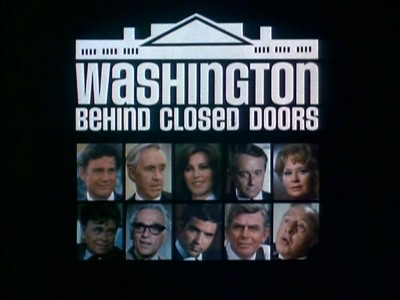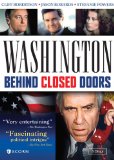| Reviews & Columns |
|
Reviews DVD TV on DVD Blu-ray 4K UHD International DVDs In Theaters Reviews by Studio Video Games Features Collector Series DVDs Easter Egg Database Interviews DVD Talk Radio Feature Articles Columns Anime Talk DVD Savant Horror DVDs The M.O.D. Squad Art House HD Talk Silent DVD
|
DVD Talk Forum |
|
|
| Resources |
|
DVD Price Search Customer Service #'s RCE Info Links |
|
Columns
|
|
|
Washington: Behind Closed Doors
Irresistible, darkly comic TV docudrama. Acorn Media has released Washington: Behind Closed Doors, the 3-disc, 6-part, 9-hour ABC miniseries from 1977, based on the Roman à clef novel, The Company, written by Watergate co-conspirator John Ehrlichman, and featuring a blockbuster cast: Cliff Robertson, Jason Robards, Stefanie Powers, Robert Vaughn, Lois Nettleton, Barry Nelson, Harold Gould, Tony Bill, Andy Griffith, John Houseman, David Selby, Lara Parker, Meg Foster, and hilarious Nicholas Pryor (who steals the whole thing right out from everyone's feet). Rarely aired since its so-so "sweeps" performance in the fall of 1977, Washington: Behind Closed Doors is addictive comedy-drama for those who remember the country's obsession with the Watergate scandal during the early-to-mid '70s, with crackerjack (if biased) scripting and uniformly fine performances from the strong cast. An informative little 8-page booklet discussing Washington: Behind Closed Doors' merging of historical fact and fiction is included in this okay-looking transfer.

President of the United States Esker Scott Anderson (Andy Griffith), in an address to the nation where he cites a recent diagnosis of leukemia, reveals his intention not to run for another term. That's potentially bad news for CIA director William Martin (Cliff Robertson), who knows his high-level career will be over should opposition rival Richard Monckton (Jason Robards) win the White House. Martin knows "vengeful little squirt" Monckton will clean house of all those "Ivy League faggots" that deceased President Curry appointed. So Martin hopes to feed secret information about Anderson's V.P. and hand-picked successor to Monckton rival Jack Atherton (Linden Chiles), via think tank scholar Dr. Carl Tessler (Harold Gould). How to do this? Seduce lovely D.C. widow Sally Whalen, who's willing to string Tessler along. Tenacious, almost-feral Monckton, however, prevails, and Martin is dead in the water, primarily because now Monckton has access to the ultra-secret "Primula File," which details CIA involvement in covert assassinations in Africa, the Caribbean, and Asia―including Martin's ordering of these hits. With Tessler interceding on his behalf, Martin hangs onto his job, but his personal life becomes complicated when he falls in love with Whalen after divorcing his wife, Linda (Lois Nettleton), a former mistress of President Anderson whom Martin married to secure his job at the CIA.
Meanwhile, opposition to America's Asian war mounts as President Monckton begins the process of destroying his political enemies. Monckton's icy, cold-hearted aide, Frank Flaherty (Robert Vaughn), fires one of the President's oldest and dearest friends/supporters, honest Bob Bailey (Barry Nelson), in order to slip in bumbling stooge Hank Ferris (Nicholas Pryor) for maximum control as Flaherty closes off access to the President. Idealistic gopher Adam Gardiner (Tony Bill) facilitates a shady cash donation for the Monckton campaign from hotelier/gambler Ozymandias (Joseph Sirola), and finds himself moving up the chain of command...which threatens his marriage to Public Television producer Paula (Francis Lee McCain). Amoral lawyer Roger Castle (David Selby) strings along pretty SEC worker Jennie Jamison (Meg Foster) while dreaming up legal loopholes for Monckton's increasingly paranoid schemes of revenge against the press and political opponents, while presidential hatchet man Tucker Tallford (John Lehne) gathers together a covert team of operatives, lead by ex-"Company" men Walter Tulloch and Lars Haglund (Phillip R. Allen and Skip Homeier), whose various illegal operations, including wiretapping and burglary, are spiraling out of control...while directly implicating the President in their activities.
Washington: Behind Closed Doors was all new to me when I spotted it in our screener pool here at DVDTalk. I had read about it frequently in television history books over the years (when the first network miniseries were discussed), but if I watched it as a kid back in 1977, I completely forgot it (unusual for me when it comes to TV back then). Maybe that's because by 1977, most of the American public was thoroughly sick to death hearing about the Watergate scandal. Having grown up during the crisis, I remember clearly how it grew to totally dominate not only TV news coverage (as well as endless references in sitcoms) but ostensibly every conversation the adults in my world had―night after night, month after month. The release of All the President's Men in 1976 seemed to put a capper on the whole ugly mess for many people (no matter how accurate it was, a fictionalized account like that tends to aesthetisize and then remove the real-life event to the past), so I'm not surprised if viewers took a take-it-or-leave-it approach to this mini back in September of 1977.
I'm certainly no scholar or even student of Watergate, but I remember enough to clearly match up the dots in real-life Watergate criminal John Ehrlichman's thinly disguised tale; anyone from my generation is going to immediately see Andy Griffith is LBJ (talking about his President "Curry," who's JFK), Monckton is Nixon, Martin is the CIA's Richard Helms, Dr. Tessler is Dr. Henry Kissinger, Flaherty is W.H. Chief of Staff H.R. Haldeman, and so on. And that's half the fun of Washington: Behind Closed Doors: watching the complicated plot unfold and trying to remember what's real, what's been fudged, and what's been outright fabricated (it's one of those docudramas that impels you to go on the net and try and backtrack it all). Of course it's all disgusting, too, when it continually sinks back in that so much of what you're enjoying here―because Washington: Behind Closed Doors is overripe fun―actually happened. Washington: Behind Closed Doors was produced right after the height of public resentment and revulsion over the scandal had peaked, but would people be as outraged today as they were back then? It's hard to say. Watergate was the first major political scandal of the modern media age that was pursued with such overwhelming zealotry, with a flogging by a sympathetic press that turned it into a "product" that fed itself for years and years for public consumption. Today, our far-more cynical (and frankly dispirited) populace might view something like Watergate as comparatively small potatoes...if they even got the chance to hear about it in our "Shhhhh...there's nothing to see here; move along" mainstream media world of Solyndra/"Fast and Furious"/Black Panthers/conservative bloggers' "S.W.A.T.ing" suppression.
Interestingly, though, Washington: Behind Closed Doors' tone isn't one of indignant rage, as one might expect considering its proximity to the real event. Instead, Washington: Behind Closed Doors has this deliciously black, comedy-of-errors atmosphere that's subdued during the Cliff Robertson/Lois Nettleton/Stefanie Powers and David Selby/Meg Foster romantic subplots, but which flowers during the hilariously grotesque scenes involving Robards' machinations in the Oval Office, and perennial loser Nicholas Pryor's peripatetic grasping for competence as he tries to hang onto his White House press job. I haven't read Ehrlichman's novel, The Company, but I would venture a guess that the romantic subplots were included to make the book more "saleable," elements that ABC no doubt kept for the same reasons: to appeal to women viewers...throw in a love story (or so the conventional wisdom went then). There's nothing wrong with those subplots; in fact, they're quite compelling in their own right, in large part due to the strong performances by the excellent cast (Robertson and Powers are particularly good together in their complicated, doomed, push-me pull-you attraction). And in the case of the Selby/Foster relationship, the trajectory of their affair perfectly illustrates the corrupting factor that the Monckton/Nixon administration has on its inner circle: Selby goes from being a well-meaning creep to an out-and-out bounder who's willing to propose marriage to endlessly used-and-abused Foster, just to keep his job for a President who can't abide "immorality."
Washington: Behind Closed Doors real pull, though, comes from those scenes with Robards and Pryor, when screenwriters Eric Bercovici (Shogun, Hell in the Pacific) and David Rintels (Scorpio, Andersonville), and director Gary Nelson (Disney's Freaky Friday and The Black Hole) let Robards rage and Pryor sweat and squirm. Robards' take on Nixon is necessarily one-sided, if you go along with the notion that his scenes are satirical in intent (a bit of humanity is let in just once, when we see Monckton's/Nixon's pain at never being on "the inside" like JFK: not rich, not privileged, having to scrap for everything he had, and being the brunt of personal, wounding attacks by a hateful press), but those biased scenes are undeniably funny in their construct of a monstrous, unquenchable ego that needs affirmation and vengeance in equal and overwhelming doses. Pryor is even better, easily walking off with the acting honors here (Vaughn won an Emmy for his turn here, and he's frighteningly perfect...but we've seen that ball-cutting iceman from him before). Constantly late for a meeting, disheveled, panting, eyeballs rolling in his head and grimacing at the shellacking he fears is always around the corner, Pryor is simply remarkable here, creating a craven, sniveling creature of ambition and politics who will do anything to feel like a "winner" to his user bosses...who view him as a clown, anyway. Washington: Behind Closed Doors' moral compass is all over the place: it views Monckton as a one-sided golem with no redeeming values, but assassination-ordering Martin, who's currently killing people in Vietnam with his covert ops, gets a romantic, dream-ending on the beach in the Bahamas, snug with his beautiful ex-wife after successfully doing to the President what the President has been doing to others...and getting derided for it in the screenplay. But when the mini focuses on a character like Pryor's, its aims are crystal clear―and brilliantly funny.
The DVD:
The Video:
The full-screen, 1.33:1 transfer for Washington: Behind Closed Doors isn't perfect, with a few scenes looking like VHS dubs, some muddy color, a semi-sharp image, and a fairly consistent brightness level. Overall, for vintage TV, not bad.
The Audio:
The Dolby Digital English split mono track is fine, with clean dialogue and little hiss. English subtitles are available.
The Extras:
An 8-page booklet, with a few color photos, outlining the historical events that back up the mini is included.
Final Thoughts:
Darkly comic miniseries. Washington: Behind Closed Doors isn't a title that normally comes to mind when listing "classic" miniseries from the form's early years, but it's a surprising (and slightly sickening) delight, deftly detailing and satirizing the abuses of power at the Nixon White House. The performances are uniformly fine. I'm highly, highly recommending Washington: Behind Closed Doors.
Paul Mavis is an internationally published movie and television historian, a member of the Online Film Critics Society, and the author of The Espionage Filmography.


|
| Popular Reviews |
| Sponsored Links |
|
|
| Sponsored Links |
|
|
| Release List | Reviews | Shop | Newsletter | Forum | DVD Giveaways | Blu-Ray | Advertise |
|
Copyright 2024 DVDTalk.com All Rights Reserved. Legal Info, Privacy Policy, Terms of Use,
Manage Preferences,
Your Privacy Choices | |||||||














